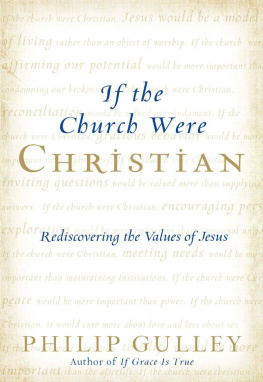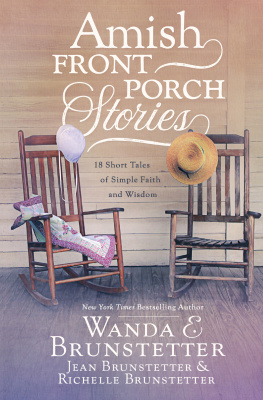S everal years back, I was visiting an elderly woman in my Quaker meeting. She was reminiscing about her childhood. I asked her what she missed the most. She closed her eyes for a moment, thinking back, then said, Porch talk. I miss the porch talk.
Social scientists and preachers offer a number of reasons for the decline of civil society: broken homes, poverty, disease, television, and increasing secularism, to name a few. I believe all that is wrong with our world can be attributed to the shortage of front porches and the talks we had on them. Somewhere around 1950, builders left off the front porch to save money, and weve had nothing but problems ever since.
I place the blame squarely at the feet of William and Alfred Levitt, who built the first modern subdivision of 17,477 homes in a Long Island potato field in 1947. The Levitt brothers have since passed away and cant argue back. I often blame dead people for that very reason.
Prior to the subdivision, whenever people built a home, they had the good sense to add a porch. Then the Levitts thought money could be saved by not adding porches. Im as much for saving money as the next guy, but porches are not the place to do it.
All manner of lessons were learned on the front porch. When the porches went, so did the stories and the wisdom with them. Today, we do our talking during the commercial breaks. This is a profound tragedy, but one we could correct by putting our televisions in the closet and porches on our homes.
The first years of my life, I lived in a house without a porch, in the first subdivision in our small town. When I turned nine, a grand old house with a porch came on the market. The Hollowell house. The Hollowells had been gone ten years, but the current owners hadnt resided in the house long enough for their name to adhere.
My parents would drive by it, slowing as they passed.
Wouldnt it be wonderful to live there? they would say to one another.
Then one Saturday morning, while Dad was walking on the town square, the owner of the jewelry store, who was also the towns realtor, stopped him.
I have just the house for you, he told my father. The Hollowell place. Theyre asking thirty thousand.
Cant afford it, my father said.
I can get you in that house for a thousand-dollar down payment, the jeweler-realtor said.
I dont have a thousand dollars, my father told him.
Write me a check, and I wont cash it until you have the money, the realtor promised.
So my father did, then and there, without telling my mother.
A few days later, the president of the bank, Hursel Disney, phoned to ask my father why he would write a check for a thousand dollars when he only had three dollars in his account.
The realtor told me he wouldnt cash it, my father explained.
Yeah, thats what he tells everyone, Hursel said. Tell you what, the check just fell off my desk and landed in back of the trash can. I probably wont find it until next month.
Thats the way the presidents of small-town banks did things back in those days.
And thats how we came to live in a house with a porch.
My memory is this: Each April, on the first warm Saturday, we would remove the storm windows, haul them up to the attic, carry down the screens, and fit them in the windows. The windows and screens, being old and handmade, lacked the exactness of factory windows. Someone, Mr. Hollowell, I presume, had written on each screen, in shaky, old-man handwriting, which window it fit. Dining room, south. Northwest bedroom, window over register. The screens never fit precisely. My father would rub a bar of soap along the frames and finesse the screens into place.
With the screens installed, we would carry the stepladder around to the front porch, lower the porch swing to its correct height, to the link in the chain with the dab of red paint, then carry the rocker up from the basement. Thus, porch season commenced.
There was an etiquette to porch sitting. People would approach our porch and stop at the foot of the steps, awaiting an invitation to join us. If one wasnt forthcoming, they knew delicate matters were being discussed and would excuse themselves after a brief exchange of pleasantries. This rule was never discussed or written down, but was generally known and obeyed by all, except by children and dull-witted adults.
Porch sitting was an evening pursuit, after the supper dishes were washed and the kitchen cleaned. We children would run underneath the streetlight, shrieking, our hands covering our hair to keep the bats out. Bats, tradition had it, made nests in your hair and drove you mad. My mother and father would watch from the porch, unconcerned, as the bats swooped past, plucking at our heads.
After a while, my mother would call us into the yard, then a while later onto the porch. Coming in for the night was always a progression. Street, yard, porch. By the time we reached the porch, we were fading and would arrange ourselves on the railing, our backs to the columns, while the adults visited. If we sat quietly and listened closely, we could hear them discuss matters we werent ordinarily privy to, stories of certain people in our town whod moved away without telling anyone.
Some evenings, if my father was feeling expansive, he would share stories of his childhood, about growing up in what he called the hard times. In later conversations with my Aunt Doris, I learned many of my fathers stories were embellished, which in no way lessened their appeal.
On nights the Cincinnati Reds played, my father would set the kitchen radio on the parlor table, open the window onto the porch, and listen to Marty Brennaman announce the game. Lee Comer would wander over from next door to provide local commentary. Lee was exempt from the rules of porch etiquette. He and any member of his family could ascend the steps without asking, and still can, since Lees son, Ben, now owns the house, even though its still called the Gulley house.
Porch talk is one of the customs weve let slide out of our lives, not realizing how desperately it is needed. Were like Mark Nickerson, a child who lived two houses down from us and ate chalk. When I asked my mother why, she told me his body probably lacked some important nutrient, which caused him to crave chalk. There is a house on the edge of our town that cost an obscene amount. Its porch is a tiny footprint of cement. A week after the new family moved in, a chair appeared outside the door, crowded among the landscaping. Its the Mark Nickerson phenomena. The family craved a porch; they just didnt know it. We were better off when porches were standard equipment.
This is the ironywe have more talk than ever before, but too little communication; so many words, but so little meaning. Bombardment is the word that comes to mindtalk radio, twenty-four-hour news, hundreds of television channels, and, God help us all, gas pumps that spout the news along with fuelcoarse exchanges fraying the ties that bind.
I miss those days of lag time, of sitting on the porch swing with my grandmother, when large chunks of summer days would pass with scarcely a word between us, her fingers caressing a rosary, me whittling a stick, the silence full and rich and comfortable. My grandmother was not long on advice, but something she told me, when my interest in romance was on the rise, remains with me still. Philip, be sure to marry someone you can be silent with and not be anxious. So I did, while also gravitating toward a religion, Quakerism, that esteemed companionable silence.













